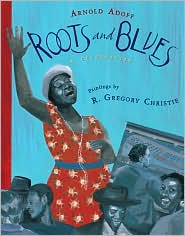Roots and Blues by Arnold Adoff, illus. by R. Gregory Christie

I am of the opinion that Roots and Blues: A Celebration by Arnold Adoff, with paintings by R. Gregory Christie, quite possibly deserves to win all the things. There. I said it. I'll be looking for this book on shortlists and award lists, and so should you be. Better still, look for this book.
Adoff's poetic style is somewhat idiosyncratic, relying on something he calls "shaped speech", which involves rather unusual text placement in many instances. Words that are meant to be read with more emphasis or duration are quite literally stretched out on the page. Gaps indicate a pause, sometimes replacing commas, sometimes dictating how you might emphasize the word before the gap in reading the poem aloud. As Adoff said in the past:
"It doesn't matter if my work has upper or lower case, or capitalization, or punctuation, or not. The structure is the shape. It's shaped form poetry. When I have done my job right, the shape and structure can
imply the subject. Sometimes it can give the feel of a first baseman or a catcher or some of the other subjects. If I have done my work right, the block of type and the double stanza breaks and the space between the words are like invisible rubber bands that hold the poem together and pull your eye along."
You can read a bit more about Adoff and his approach to poetry in this NCTE profile piece.
Roots and Blues traces the history of blues music, beginning with African songs, traveling on slave ships and through plantations and chain gangs and sharecroppers. Spirituals and lullabyes and church music and jazz. The book meanders chronologically, wandering the paths in the South that the music wound through, through fields and houses and the Mississippi River and more. Most of the poems have titles; many of those titles are complete sentences, or the start of the poem that follows. Sometimes reading just the titles in sequence tells a story (as in the poems on pages 16-18, entitled "The Giant Ice Mountains Slide South" "Down In the Delta As Sure as River Rises" "Engineers of Memory Kept Plans During Generations.") Interspersed are a bunch of poems written all in italics, each one labelled "Listen"; those poems describe the sounds of the place and time Adoff has been (or is now) talking about. There are a lot of "Listen" entries interspersed, and they make complete sense in context, even though I fear I'm not doing them justice here.
Some of the poems are breathtaking, heartbreaking things. For example, this one, which employs a double meaning for the word sing that is chilling:
From Africa And Caribbean Shores
to those t i m e s of d i r t floors
and the blood of mothers: moving
from c o t t o n fields a n d flooded
rice acres we arrive at the time
of morning greetings of b i r d s.
The g r i o t cackles as the story
ends and the p l a n t a t i o n
w h i p s crack high into treble
lines of lines of lines:
s i n g i n g.
Or this one:
Swamps And Smells Old River Floods Just Mud.
Prisons and chain gangs and cotton fields and
dogs howling on moonless nights and guards
and
dogs
and
dogs
and
dogs
and
dogs.
And guys, I gotta tell you - the fact that I was willing to spend nearly two hours coding those two poems to get them even close to the right format for you should tell you how very much I admire them and really wanted to share them with you.
The later poems describe and evoke the music and instruments of the blues. "Blues Harp Called Mouth Organ Called Blues Harp" is all about the harmonica (of course), and describes how it feels to play it as well as what it is. There are poems about famous blues artists - Robert Johnson, Muddy Waters, Johnny Lee Hooker, Big Joe Turner, Eric Clapton, Stevie Ray Vaughan and more - and poems that evoke the music itself (such as "Singing" and "You Know You Never Miss the Water").
The book is a tour-de-force tour of the history of the blues, and one that belongs in every middle school library or collection of poetry, African American history, or music history books. I borrowed the copy I reviewed from my public library, but will be purchasing one for my very ownsome. Before it starts to win ALL THE THINGS.

